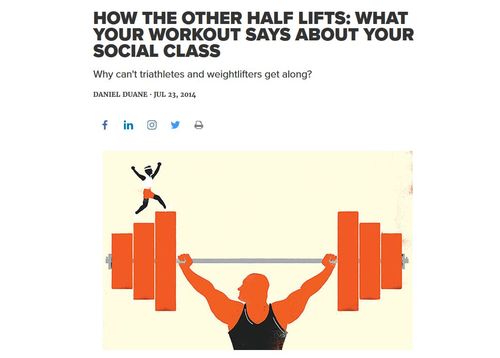HOW THE OTHER HALF LIFTS: WHAT YOUR WORKOUT SAYS ABOUT YOUR SOCIAL CLASS
Why can’t triathletes and weightlifters get along?
DANIEL DUANE JUL 23, 2014

I first heard the term strength sports — referring to football, weightlifting, and any other sport dependent upon sheer muscular force — in my early 40s. I’d spent half a lifetime dedicated to athletics more common among urban liberals like myself — jogging, cycling, swimming, pursuing cardiovascular fitness instead of brute force.
… So I bought a book by a Texas gym owner named Mark Rippetoe titled Starting Strength: Basic Barbell Training. …
Walking down the sidewalk, I felt confident. At parties with my wife, I saw men who ran marathons, and they looked gaunt and weak. I could have squashed them.
Soon, however, I suffered a creeping insecurity. Looking into the eyes of a banker with soft hands, I imagined him thinking, You deluded moron, what does muscle have to do with anything?
One day, a skinny triathlete jogged past our house: visor, fancy sunglasses, GPS watch. I caught a look of yearning in my wife’s eyes. That night, we fought and she confessed: She couldn’t help it, she liked me better slender.
Friends came for dinner. A public-interest lawyer, noticing I was bigger, asked what I’d been up to.
“I’m really into lifting weights right now,” I said. “Trying to get strong.”
The lawyer’s wife, a marathoner and family therapist, appeared startled, as if concerned about my emotional state. She looked me in the eye and said, “Why?”
Sociologists, it turns out, have studied these covert athletic biases. Carl Stempel, for example, writing in the International Review for the Sociology of Sport, argues that upper middle class Americans avoid “excessive displays of strength,” viewing the bodybuilder look as vulgar overcompensation for wounded manhood. The so-called dominant classes, Stempel writes — especially those like my friends and myself, richer in fancy degrees than in actual dollars — tend to express dominance through strenuous aerobic sports that display moral character, self-control, and self-development, rather than physical dominance. By chasing pure strength, in other words, packing on all that muscle, I had violated the unspoken prejudices — and dearly held self-definitions — of my social group. …
